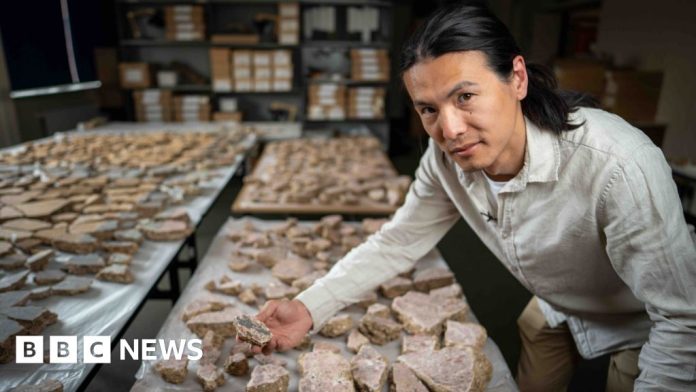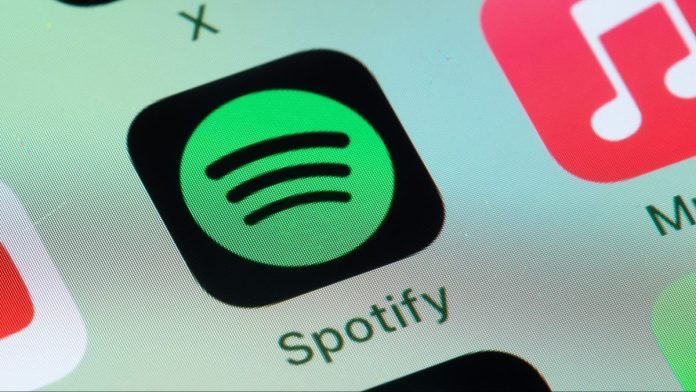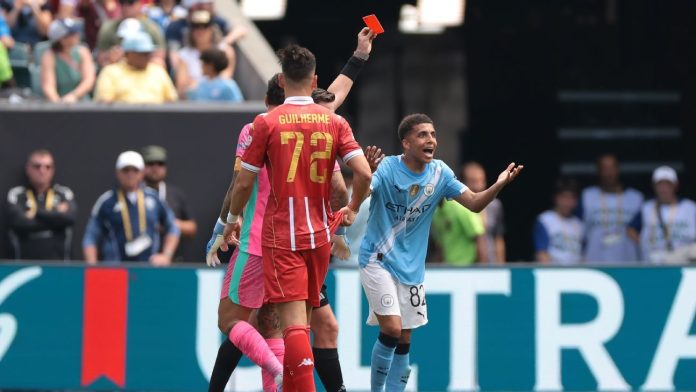The Surge in Ocean Shipping Rates Is Peaking
The Surge in Ocean Shipping Rates Is Peaking
Here are the 24 US AI startups that have raised $100M or more in 2025
Last year was monumental for the AI industry in the U.S. and beyond.
There were 49 startups that raised funding rounds worth $100 million or more in 2024, per our count at TechCrunch; three companies raised more than one “mega-round,” and seven companies raised rounds that were $1 billion in size or larger.
How will 2025 compare? It’s still the first half of the year, but so far it looks like 2024’s momentum will continue this year. There have already been multiple billion-dollar rounds this year, and more AI mega-rounds closed in the U.S. in Q1 2025 compared to Q1 2024.
Here are all the U.S. AI companies that have raised $100 million this year:
June
- Enterprise search startup Glean continues to rake in cash. The company announced a $150 million Series F round on June 10, led by Wellington Management with participation from Sequoia, Lightspeed Venture Partners, and Kleiner Perkins, among others. Glean is now valued at $7.25 billion.
- Anysphere, the AI research lab behind AI coding tool Cursor, raised a sizable $900 million Series C round that values the company at nearly $10 billion. The round was led by Thrive Capital with participation from Andreessen Horowitz, Accel, and DST Global.
May
- AI data labeling startup Snorkel AI announced a $100 million Series D round on May 29, valuing the company at $1.3 billion. The round was led by Addition with participation from Prosperity7 Ventures, Lightspeed Venture Partners, and Greylock.
- LMArena, a popular, community-driven benchmarking tool for AI models, raised a $100 million seed round that valued the startup at $600 million. The round was announced on May 21 and was co-led by Andreessen Horowitz and UC Investments. Lightspeed Venture Partners, Kleiner Perkins, and Felicis also participated, among others.
- Las Vegas-based AI infrastructure company TensorWave announced a $100 million Series A round on May 14. The round was co-led by Magnetar Capital and AMD Ventures with participation from Prosperity7 Ventures, Nexus Venture Partners, and Maverick Silicon.
April
- SandboxAQ closed a $450 million Series E round on April 4 that valued the AI model company at $5.7 billion. The round included Nvidia, Google, and Bridgewater Associates founder Ray Dalio among other investors.
- Runway, which creates AI models for media production, raised a $308 million Series D round that was announced on April 3, valuing the company at $3 billion. It was led by General Atlantic. SoftBank, Nvidia, and Fidelity also participated.
March
- AI behemoth OpenAI raised a record-breaking $40 billion funding round that valued the startup at $300 billion. This round, which closed on March 31, was led by SoftBank with participation from Thrive Capital, Microsoft, and Coatue, among others.
- On March 25, Nexthop AI, an AI infrastructure company, announced that it had raised a Series A round led by Lightspeed Venture Partners. The $110 million round also included Kleiner Perkins, Battery Ventures, and Emergent Ventures, among others.
- Cambridge Massachusetts-based Insilico Medicine raised $110 million for its generative AI-powered drug discovery platform as announced on March 13. This Series E round valued the company at $1 billion and was co-led by Value Partners and Pudong Chuangtou.
- AI infrastructure company Celestial AI raised a $250 million Series C round that valued the company at $2.5 billion. The March 11 round was led by Fidelity with participation from Tiger Global, BlackRock, and Intel CEO Lip-Bu Tan, among others.
- Lila Sciences raised a $200 million seed round as it looks to create a science superintelligence platform. The round was led by Flagship Pioneering. The Cambridge, Massachusetts-based company also received funding from March Capital, General Catalyst, and ARK Venture Fund, among others.
- Brooklyn-based Reflection.Ai, which looks to build superintelligent autonomous systems, raised a $130 million Series A round that values the 1-year-old company at $580 million. The round was led by Lightspeed Venture Partners and CRV.
- AI coding startup Turing closed a Series E round on March 7 that valued the startup, which partners with LLM companies, at $2.2 billion. The $111 million round was led by Khazanah Nasional with participation from WestBridge Capital, Gaingels, and Sozo Ventures, among others.
- Shield AI, an AI defense tech startup, raised $240 million in a Series F round that closed on March 6. This round was co-led by L3Harris Technologies and Hanwha Aerospace, with participation from Andreessen Horowitz and the US Innovative Technology Fund, among others. The round valued the company at $5.3 billion
- AI research and large language model company Anthropic raised $3.5 billion in a Series E round that valued the startup at $61.5 billion. The round was announced on March 3 and was led by Lightspeed with participation from Salesforce Ventures, Menlo Ventures, and General Catalyst, among others.
February
- Together AI, which creates open source generative AI and AI model development infrastructure, raised a $305 million Series B round that valued the company at $3.3 billion. The February 20 round was co-led by Prosperity7 and General Catalyst with participation from Salesforce Ventures, Nvidia, Lux Capital, and others.
- AI infrastructure company Lambda raised a $480 million Series D round that was announced on February 19. The round valued the startup at nearly $2.5 billion and was co-led by SGW and Andra Capital. Nvidia, G Squared, ARK Invest, and others also participated.
- Abridge, an AI platform that transcribes patient-clinician conversations, was valued at $2.75 billion in a Series D round that was announced on February 17. The $250 million round was co-led by IVP and Elad Gil. Lightspeed, Redpoint, and Spark Capital also participated, among others.
- Eudia, an AI legal tech company, raised $105 million in a Series A round led by General Catalyst. Floodgate, Defy Ventures, and Everywhere Ventures also participated in the round in addition to other VC firms and numerous angel investors. The round closed on February 13.
- AI hardware startup EnCharge AI raised a $100 million Series B round that also closed on February 13. The round was led by Tiger Global with participation from Scout Ventures, Samsung Ventures, and RTX Ventures, among others. The Santa Clara-based business was founded in 2022.
- AI legal tech company Harvey raised a $300 million Series D round that valued the 3-year-old company at $3 billion. The round was led by Sequoia and announced on February 12. OpenAI Startup Fund, Kleiner Perkins, Elad Gil, and others also participated in the raise.
January
- Synthetic voice startup ElevenLabs raised a $180 million Series C round that valued the company at more than $3 billion. It was announced on January 30. The round was co-led by ICONIQ Growth and Andreessen Horowitz. Sequoia, NEA, Salesforce Ventures, and others also participated in the round.
- Hippocratic AI, which develops large language models for the healthcare industry, announced a $141 million Series B round on January 9. This round valued the company at more than $1.6 billion and was led by Kleiner Perkins. Andreessen Horowitz, Nvidia, and General Catalyst also participated, among others.
This piece was updated on April 23 and June 18 to include more deals.
This piece has been updated to remove that Abridge is based in Pittsburgh; the company was founded there.
Xabi Alonso says Real Madrid makeover ‘a process’ after draw
Xabi Alonso called for patience after Real Madrid‘s 1-1 draw with Al Hilal in their opening game at the Club World Cup, saying implementing the changes he wants to make “will take time.”
Madrid struggled in the first half at Hard Rock Stadium, Miami, before young forward Gonzalo García put them ahead in the 34th minute.
Rúben Neves equalised for Al Hilal from the penalty spot, and Madrid had the chance to win the game in added time with another penalty, only for goalkeeper Yassine Bounou to save Federico Valverde‘s spot kick.
“The second half was much better than the first,” Alonso said in his post-match news conference. “In the first half we lacked a lot of things, we didn’t have balance. We’ve talked about that.
“I liked the reaction. We were able to change our rhythm, have more control, and play more in the opposition half. It’s a process. We have to take the positives and look to improve.”
Alonso, who replaced predecessor Carlo Ancelotti after Madrid failed to land a major trophy last season, only took his first training session on June 9, before flying to the United States for the tournament.
“I knew it would take time,” he said. “There are things we have to change. We’ll have to correct them, and we’ll keep doing that. Everything takes time, we’ve had nine days, and some players have had just three training sessions. It’s demanding, we’re in a competition, but we want to learn, and what we want to do will take time.”
“[Alonso] wants to see his way of playing, a different way to defend and a different way to attack,” goalkeeper Thibaut Courtois said. “We were with Ancelotti for four years, we have some ‘automatisms’ and we have to change them to what the new coach wants.
“That doesn’t happen in four days. We’re trying, we’re watching videos, talking a lot, and it will get better. We’ll learn a lot from this first game.”
Madrid were without star forward Kylian Mbappé — who scored 43 goals in all competitions last season — for the game, after he came down with a fever this week.
“We don’t know,” Alonso said, when asked if Mbappé would return for Madrid’s next game with Pachuca on Sunday. “We’ll have to see how his recovery goes. The last two days he’s been ill with a virus.”
TikToker Sydney Towle Shares Heartbreaking Cancer Update
TikToker Sydney Towle Shares Heartbreaking Update Amid Cancer Battle: “This Isn’t Good”
Sydney Towle is getting candid about the struggles of staying positive through her traumatic cancer experience.
The Dartmouth graduate, who was diagnosed with cholangiocarcinoma, or as bile duct cancer, two years ago, shared a sad update with her 800,000 TikTok followers on June 17.
“It’s the first time that I’ve gone in and they’ve said, ‘This isn’t good,'” Sydney said in a video. “It’s obviously not what you want to hear when you have cancer.”
She continued to share that the latest update to her health will require her to get a hepatic pump, which according to UPenn Medicine, is “a medical device used to deliver chemotherapy directly to the liver.”
Sydney—who will go in for surgery on June 30 and remain hospitalized for four or five days—noted that trying the pump in combination with the chemo will be “experimental.”
Through tears, she added how her health has interfered with her normal life as a 25-year-old.
“I didn’t talk about it because I was scared this was going to happen,” she said. “I was supposed to go on a trip and leave June 30, so I just canceled the trip. Hopefully I’ll still get to take it one day.”
Huge archaeological puzzle reveals Roman London frescoes
Senior science journalist
Archaeologists have pieced together thousands of fragments of 2,000-year-old wall plaster to reveal remarkable frescoes that decorated a luxurious Roman villa.
The shattered plaster was discovered in 2021 at a site in Central London that’s being redeveloped, but it’s taken until now to reconstruct this colossal jigsaw puzzle.
The frescoes are from at least 20 walls of the building, with beautifully painted details of musical instruments, birds, flowers and fruit.
The art is revealing more about the affluence of the area where they were found – described by the team as the “Beverly Hills of Roman London”.
 Tony Jolliffe/BBC News
Tony Jolliffe/BBC News Tony Jolliffe/BBC News
Tony Jolliffe/BBC NewsThere are also clues about who the artists were: one fragment is scored with the Latin word Fecit, which means “has made this” – but the piece where the name should be is missing.
The Museum of London Archaeology (Mola) team still hope the vital piece will be found as they sift through the fragments.
“It’s one of the biggest – if not the biggest – assemblages of Roman wall plaster and paintings we’ve ever found in Roman London,” said Han Li from Mola.
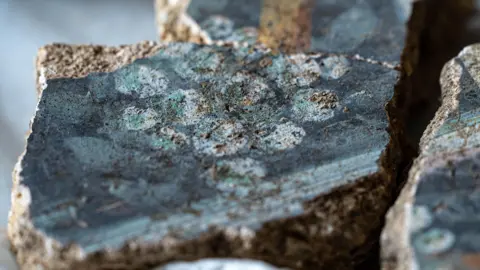 Tony Jolliffe/BBC News
Tony Jolliffe/BBC NewsThe largest of the frescoes, measuring about 5m by 3m, has a lower section of pale pink, dotted with specks of paint to imitate marble. Above are rich yellow panels with soft green borders.
The wall paintings are adorned with candelabras, stringed instruments called lyres, white cranes and a delicate daisy.
There’s also what appears to be a bunch of grapes, but archaeobotanists believe that this is a plant that grows locally – mistletoe.
“That is actually quite interesting for me, because you’re seeing that the Roman painters are taking a classical idea and they’re very much putting their own North West European, or local, twist on it. I think that’s magnificent,” says Han Li.
 Tony Jolliffe/BBC News
Tony Jolliffe/BBC NewsHe spent many months with the jumble of plaster, meticulously examining each piece to put together what he describes as “the world’s most difficult jigsaw puzzle”.
The fragility of the ancient fragments made this even more of a challenge.
“You have to be very careful because you can only assemble the pieces a small number of times before the plaster starts to be damaged and it flakes off,” he said.
“So you have to be quite sure before you join the pieces that this is the piece that may fit.”
 Tony Jolliffe/BBC News
Tony Jolliffe/BBC NewsThe Romans founded London in AD43, and the villa was built soon after, dating to the first or second century when the new city was growing rapidly.
The archaeologists think this grand building may have been home to a wealthy family or a hotel for rich travellers passing through Londinium.
They’ve been comparing the frescoes to others found across Britain and Europe, and they believe they were created by a group of highly skilled painters who travelled the Roman empire.
“They’ve come to Roman London where there was a building boom, with many houses and many buildings going up that required painting. And they went around essentially taking on huge commissions of work,” said Han Li.
“It’s amazing to imagine that their work is now again visible to us 2,000 years later.”
The artists’ exact identity however will remain elusive until the missing fragment bearing their names is found.
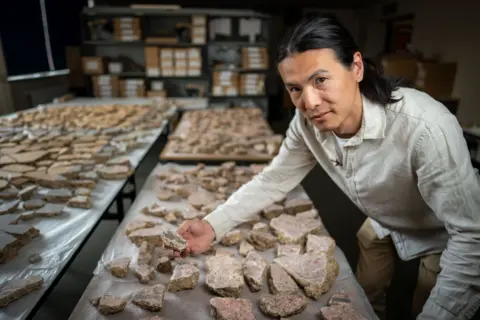 Tony Jolliffe/BBC News
Tony Jolliffe/BBC NewsThe plaster was found in Southwark, just south of the Thames. A stunning mosaic and Roman cemetery were also unearthed at the site, which was being excavated in preparation for a new development.
This location, outside of the central hub of Roman London, is also revealing more about how the city was spreading out.
“There was this thriving, bustling settlement quite early on in the Roman period, and it’s almost the kind of wealthy suburb – the Beverly Hills of Roman London,” said Andrew Henderson-Schwartz from Mola.
“And what this shows is that the Romans are committing to London. They’re investing in London, and they’re seeing it as a place to settle in, a place to stay. It’s not just a kind of provincial outpost.”
There’s still much to discover from the fresco fragments, helping archaeologists reconstruct the story of the UK’s rich Roman history.
 Tony Jolliffe/BBC News
Tony Jolliffe/BBC NewsEarth is absorbing too much sunlight: It’s a waking climate giant

Albedo is the reflection of sunlight back into space, mainly from bright surfaces such as clouds, snow, ice and atmospheric particles, providing an essential planetary cooling shield.
However, a 2021 NASA study found that the excess of incoming sunlight over outgoing radiation, known as Earth’s energy imbalance, has doubled since 2005. Satellite data reported in this study shows our planet now reflects 1.7 percent less sunlight than 20 years ago, and the decline is speeding up, amplifying global warming.
An international Albedo Accord is needed to reverse the darkening of the world, making sunlight reflection a key climate strategy.
Albedo loss causes about four times more immediate warming than carbon dioxide emissions, according to “Global Warming in the Pipeline,” a 2023 article by James Hansen and colleagues.
With more solar heat entering the Earth system, sunlight that used to be reflected safely back to space is now heating the oceans, land and air. Hansen’s analysis shows that albedo loss is not a subtle background shift — it’s becoming a dominant driver of global warming.
Tropical marine clouds contribute one-fifth of Earth’s albedo. But as oceans warm, these clouds are evaporating by about 1.5 percent per decade, taking their reflectivity with them.
Loss of clouds drives a dangerous feedback loop: As warming vaporizes clouds, more solar radiation reaches the planet’s surface, evaporating more water. This increases water vapor, a powerful greenhouse gas. More water vapor, combined with less cloud cover, causes further warming and worsens extreme weather.
A hotter world gets darker; a darker world gets hotter. Albedo is the awakening climate giant.
Carbon emission reduction alone cannot prevent climate tipping points, which are already activating at 1.5 degrees Celsius warming, such as the loss of coral reefs, ice and permafrost. Without a brighter Earth, these cascading effects will be unstoppable.
Concerted action to restore albedo could become a fast, safe, economic and acceptable strategy to slow warming, buying time to manage the longer-term problem of greenhouse gases.
Yet albedo remains almost entirely absent from climate strategies under the Paris Accord. The failure to prioritise albedo means governments are claiming to fight climate change while ignoring the most urgent and effective lever available to reduce heat.
To focus only on greenhouse gas emissions, while critically important for long-term climate stability, neglects the urgent and growing heating from albedo loss. Emission cuts, even augmented by greenhouse gas removal, do nothing to prevent warming from the loss of ocean clouds and polar ice. Climate policy requires a strategic pivot.
An Albedo Accord could help address this problem.
The successful Montreal Protocol brought nations together to phase out ozone-depleting substances. A similar international focus on Earth’s protective cooling shield of sunlight reflection could coordinate research, development and governance of albedo-restoring methods, as the most effective strategy to slow global warming.
We must protect the “albedo layer” just as we repaired the planet’s ozone layer.
Climate researchers have proposed technologies including marine cloud brightening, stratospheric aerosols, surface mirrors, sea ice thickening and ocean nanobubbles to reflect more sunlight and reduce near-term heat.
Some of these methods could be one thousand times better value for money than emission reduction in their cooling impact, according to estimates by the Royal Society.
Of course, such interventions come with serious responsibilities. They must be based on solid science, effective governance, public engagement and robust equity safeguards, with risks and benefits well understood. The geopolitical implications are profound.
In addition to environmental protection, action to restore albedo can provide benefits for climate stability, national interest and strategic advantage. Like the Montreal Protocol, an Albedo Accord can succeed only with public trust, global collaboration and transparency under international law.
A brighter Earth won’t solve every problem, but without it, every other climate effort will fall short. The sleeping giant of albedo is the climate system’s protective shield. Albedo restoration must now become a global priority.
Robert Tulip is an independent climate researcher based in Australia, affiliated with the Healthy Planet Action Coalition. Valerie Abrecht helped to write this article.
Novo Nordisk Reclaims Top Spot in Europe by Market Value
Novo Nordisk A/S (NYSE:NVO) is among the best bear market stocks to buy according to analysts. Novo Nordisk A/S (NYSE:NVO) has reclaimed its crown as Europe’s most valuable publicly traded company, surpassing German software giant SAP SE (ETR:SAPG). With a market capitalization of $355.904 billion, the giant’s stock surged by nearly 10% in the last five days.
Two major developments have taken place in recent days. Firstly, Novo Nordisk A/S (NYSE:NVO) has revealed its plan to advance its amycretin treatments into Phase 3 clinical trials for weight management. By the first quarter of 2026, the company expects to launch a Phase 3 development program for amycretin aimed at overweight or obese adults.
An elderly couple receiving insulin from a pharmacist, representing healthcare company’s successful pharmaceutical products.
Secondly, the Financial Times reported that activist hedge fund Parvus Asset Management has purchased shares of the company, which further boosted investor confidence. Moves like these signal that Novo Nordisk A/S (NYSE:NVO) is truly a leader in the market.
Novo Nordisk A/S (NYSE:NVO) is a Denmark-based company that engages in the research and development, manufacture, and commercialization of pharmaceutical products. Founded in 1923, it has two main segments: Diabetes and Obesity Care, and Rare Diseases.
While we acknowledge the potential of NVO as an investment, we believe certain AI stocks offer greater upside potential and carry less downside risk. If you’re looking for an extremely undervalued AI stock that also stands to benefit significantly from Trump-era tariffs and the onshoring trend, see our free report on the best short-term AI stock.
READ NEXT: The Best and Worst Dow Stocks for the Next 12 Months and 10 Unstoppable Stocks That Could Double Your Money.
Disclosure: None.
New code in Spotify’s app references the long-awaited ‘lossless’ tier
It’s been over four years since Spotify first announced its plans to launch a lossless audio tier that has yet to arrive.
After numerous leaks and teases from company execs, we know better than to start hoping that the long-delayed service could be finally nearing arrival.
But newly added references in the music app’s code suggest the lossless service is at least still under development and could even be getting closer to launch.
According to technologist and reverse engineer Chris Messina, a number of references to “lossless” have popped up in Wednesday’s build of the Spotify desktop app.

These code snippets mainly refer to help cards that would appear to inform the end user about what the lossless tier offers and how to use or troubleshoot the service.
For instance, one card says, “Lossless music, now in premium,” while another describes it as the “best sound quality on Spotify for music in up to 24-bit/44.1 kHz.”
Some of the cards warn users that particular songs aren’t available in lossless or when their device has bad connectivity, which could affect playback. Another notes that lossless music is “best enjoyed on devices compatible with Spotify Connect and/or wired devices.”

In addition, Reddit user u/bendotlc noted that other changes were seen in the latest version of the mobile app, where the code now mentions lossless: “Say hello to the best sound quality on Spotify. Listen to high-fidelity music in up to 24-bit/44.1 kHz.” The Redditor claims the feature is actually present in the app, but is currently disabled. (TechCrunch confirmed these claims with data provided by Appsensa, see below.)

Of course, code references don’t mean the lossless feature is coming anytime soon.
As we’ve seen in previous years, leaks and code references have appeared before, and yet the high-quality audio tier never arrived.
When asked directly about lossless and other plans for premium tiers on recent earnings calls with investors, Spotify execs, including CEO Daniel Ek, would only hint that the company was investing in premium products for “super fans.” They wouldn’t give a time frame on when these or any other higher-quality streaming options would finally launch.
Most recently, Spotify Chief Business Officer Alex Norstrom told investors on the Q1 2025 call that Spotify was still investing in more premium tiers.
“Now, with regards to higher tiers, we see great potential in them as we’ve mentioned before,” he said. “So creating higher tiers around new offerings is something we are working towards as it really opens up new opportunities to delight users,” Norstrom said at the time.
When Spotify first announced its plans for Spotify HiFi, as it was then called, in 2021, it said that the service would offer users music in “CD-quality, lossless audio format.” It had run tests of a lossless option in the years before this, however.
Eventually, Spotify pointed to licensing issues as the reason for its delay in launching.
In what could be promising news on that front, the streamer signed new deals with labels including Warner Music and Universal Music Group in early 2025, which could pave the way for the lossless tier — or so music fans hope.
Bloomberg also reported earlier this year that a premium Music Pro tier would launch later in 2025, which would include high-quality streaming, remixing, and other features.
Spotify declined to comment on this report.
Updated after publication with additional data from Spotify’s mobile app.
Guardiola laments ‘unnecessary’ Lewis red in Man City win
Manchester City boss Pep Guardiola described Rico Lewis‘ 88th-minute red card in Wednesday’s 2-0 win over Wydad AC as an “unnecessary” decision by the referee.
City opened their Club World Cup campaign in Philadelphia with a comfortable victory courtesy of first-half goals from Phil Foden and Jérémy Doku.
However, the game ended on a sour note as City defender Lewis was dismissed for a tackle on Samuel Obeng, initially winning the ball before catching the Wydad forward in the face as he followed through.
Asked about the incident, Guardiola referenced Lewis’ unfortunate dismissal in a Premier League match against Crystal Palace back in December when the 20-year-old was sent off for a challenge on Trevoh Chalobah.
Replays on that occasion showed Chalobah had in fact caught Lewis, but VAR was unable to intervene due to it being a second yellow card offence.
“[Rico’s] leg was little bit high, but he was on the grass,” Guardiola said after the match on Wednesday. “Touches the ball with the speed that they go through, your leg has to be a little bit high and the other player down.
“It was not intentional and it was a red card versus Crystal Palace after the referee came and said it wasn’t a red card. Rico never had intention to hurt anyone. A little bit unnecessary, the red card. The referee is the boss and had other intentions, VAR checked it and we have to accept the decision.”
Lewis will serve an automatic one-match ban although there is a possibility to review the decision with FIFA able to increase the punishment if necessary.
“It’s not my decision, but I think it’s a possible red card because it wasn’t with intention to put his boot in my face but he touched it with his boot after the action,” Wydad’s Obeng said. “I think it’s normal. It’s football, that can happen. He has to apologise to me — not me to him.”
Guardiola handed debuts to new arrivals Tijani Reinders and Ryan Cherki while Rodri was introduced for the final 30 minutes in his longest appearance since suffering knee ligament damage in September.
“Definitely [Rodri] playing [to start] next season [full fit] that’s for sure,” said Guardiola. “It’s important he takes minutes. He played 15 minutes in the final Premier League game and now his first 30. His mind is ready but his body sometimes… but it’s good to play 30 minutes, maybe more than expected.
“Step by step. He has to not put too much pressure on himself. He has to understands he came from nine months injured. Every time he plays and every action he plays will make it better for the next one. The season after this type of surgeries. So he has to be relaxed and calm and step by step he will be back to what he was.”
On Reinders, Guardiola added: “He’s a really good player. You feel it, you smell it. Pace, in the final third. When he gets the rhythm he will be top.”
Justin Bieber Reacts to “Standing on Business” Video Memes
It’s not clocking to Justin Bieber‘s haters that he’s in on the joke.
After a video of him lecturing paparazzi to leave him alone because he’s “standing on business” went viral, the “What Do You Mean” singer playfully clapped back at those making fun of him over the clip.
In a photo shared to his Instagram Story June 18, Justin posed for a close-up, black-and-white selfie while wearing a hoodie and sporting a mustache and beard. To accompany the image, the 31-year-old added Myia B Music‘s song “Stand on Business” to the post, particularly highlighting the lyrics, “When I get you alone, She said I stand on business.”
And that wasn’t the only way Justin hilariously doubled down on his choice of words. The Grammy winner shared several more selfies to his Instagram Story as well, each with a different song that references the colloquial phrase, including Soulja Rilla‘s “Standing on Business” and Fredo Bang‘s “Dat Business.”




